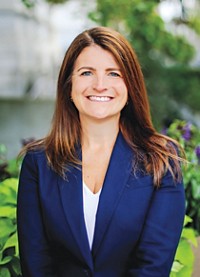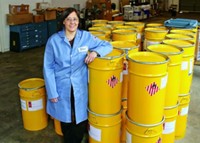Advertisement
Grab your lab coat. Let's get started
Welcome!
Welcome!
Create an account below to get 6 C&EN articles per month, receive newsletters and more - all free.
It seems this is your first time logging in online. Please enter the following information to continue.
As an ACS member you automatically get access to this site. All we need is few more details to create your reading experience.
Not you? Sign in with a different account.
Not you? Sign in with a different account.
ERROR 1
ERROR 1
ERROR 2
ERROR 2
ERROR 2
ERROR 2
ERROR 2
Password and Confirm password must match.
If you have an ACS member number, please enter it here so we can link this account to your membership. (optional)
ERROR 2
ACS values your privacy. By submitting your information, you are gaining access to C&EN and subscribing to our weekly newsletter. We use the information you provide to make your reading experience better, and we will never sell your data to third party members.
Business
Nicola Pohl
Her custom synthesis firm just moved to a new state, with an eye toward vaccines, therapeutics
by Carmen Drahl
August 20, 2012
| A version of this story appeared in
Volume 90, Issue 34

When the germ of a business idea sprouted in her lab, Nicola L. Pohl was ready. Pohl’s mother had founded a construction company, and Pohl herself had been a member of Junior Achievement, an organization that teaches business skills to teens. In college, she had participated in Harvard Student Agencies, an incubator space for student-run firms. As if that weren’t enough, she had been a postdoc at Stanford University during the height of the biotech boom.
COVER STORY
Nicola Pohl
Pohl, now the Joan & Marvin Carmack Chair in Bioorganic Chemistry at Indiana University, Bloomington, says her love of teaching drew her to academe. She started her academic career in 2000 at Iowa State University, where she began her quest to make carbohydrate synthesis an easier proposition. One of her team’s techniques, a solution-phase approach, proved so popular that she was swamped with requests for material. “It wasn’t a single aha moment,” says the 43-year-old, but she gradually realized that supplying scientists was a commercializable idea.
Pohl filed a patent on her technology with the help of Iowa State’s technology transfer office but didn’t start a company straight away. “I waited until post-tenure for two reasons,” she explains. The first was to feel out the technology. The second was that “not everyone on the faculty was necessarily fully supportive” of entrepreneurial efforts.
Once tenured, Pohl began laying the groundwork for her custom carbohydrate synthesis company, LuCELLa Biosciences. The company’s cofounder is Beatrice Collet, a former postdoc from Pohl’s lab with a deep interest in the business side of science.
Pohl and Collet set up shop for LuCELLa in Iowa State’s Innovations Development Facility, an incubator space on campus that Pohl says is open to any nascent business in Iowa, not just those started by Iowa State faculty. She says it was important to have a separate space for company operations to ensure that her academic lab retained its educational mission. “My students aren’t doing anything they can’t publish or talk about at conferences,” she says.
While getting started, Pohl and Collet frequented the Iowa Small Business Development Center, in Ames. Public-private partnerships like it exist around the country, Pohl says, but the ones near research campuses are likely to have more experience with science-driven business ideas. The center helped her find mentors and alerted her to funding opportunities. One was the Grow Iowa Values Financial Assistance Program, which provides money to projects with an economic benefit to the state and a focus on job creation.
A Small Business Technology Transfer (STTR) grant from the U.S. government brought additional funding, as did money from Pohl’s own pocket.
Pohl saves by outsourcing management of the company website, as well as payroll and accounting duties. All of LuCELLa’s chemistry is done in-house.
LuCELLa Biosciences
Year founded: 2008
Services: Custom carbohydrate synthesis
Number of employees: Two
Source of start-up funds: Federal STTR grant and private funds (including Grow Iowa monies and personal funds)
Profiled founder’s current role in company: President and cofounder
Advice: Find managers “you would trust with your own checkbook.”
Health care is a drain on resources, and it costs more to insure women than men, Pohl adds. “I think it would be wonderful if the American Chemical Society had group insurance plans that organizations could buy into.”
For its part, ACS offers professional liability insurance for companies, but not group health insurance, says Jean A. Parr, program director for the ACS Member Insurance Program. “While we’re not currently set up as an employee benefits operation, we’re starting to look at plans that would be of help to entrepreneurs.”
Pohl hasn’t yet accepted venture capital or angel funds. “We don’t want to take money from anyone unless we know we have a concrete management plan in place,” she says.
The need to formulate that plan is part of the reason she moved her company and research lab from Iowa to Indiana this summer. She’d like LuCELLa to morph into a provider of diagnostics and therapeutics. The pool of potential chief executive officers in the Indianapolis area, home to Eli Lilly & Co. and Roche Diagnostics, is a big draw. “Tech companies don’t succeed or fail based on their technology—they succeed or fail based on management,” she says.
“It’s really important to find a good group of people to guide the company,” Pohl comments. “You need to find people you would trust with your own checkbook.”
It’s too early to call LuCELLa a successful business, Pohl adds. “It depends on what your measurement is. For most start-ups the exit strategy is being acquired or going public, and we’re not there yet.”





Join the conversation
Contact the reporter
Submit a Letter to the Editor for publication
Engage with us on Twitter